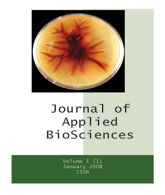Journal of Applied Biosciences (J. Appl. Biosci.) [ISSN 1997 - 5902]
Volume 37: 2434 - 2440. Published January 10, 2011.
Assessment of the quality of water in wells at Bépanda quarter, Douala-Cameroon, by use of the indicator bacteria of faecal contamination
Djuikom E, Louis B. Jugnia, Nola M
1Université de Douala, Faculté des Sciences, BP 24157 Douala, Cameroun
2National Research Council Canada, Biotechnology Research Institute, 6100 Royalmont Avenue, Montreal, QC, Canada H4P 2R2
3Université de Yaoundé, Faculté des Sciences, BP 812, Yaoundé, Cameroun
ABSTRACT
Objective: A bacteriological study was carried out over five months to assess the water quality of seven wells located in the same quarter Bépanda (Douala). These wells were selected according to their presence of a near source of pollution, the number of users and the prevalence of total coliform.
Methodology and results: Faecal coliform (FC) and faecal streptococci (FS) were analysed using the membrane filter technique with specific culture media Mac Conkey and Slanetz and Bartley agar, respectively. Counts of these bacteria were well above standards established by Word Health Organization for primary human contact (FC < 100 CFU/100 ml and FS < 100 CFU/100 ml), and varied from 102 to 21.104 CFU/100 ml for total coliform, 102 to 45.103 CFU/100 ml for faecal coliform and to 10 to 24.101 CFU/100 ml for faecal streptococci.
Conclusion and application: It was concluded that users of water from the investigated wells are risk of contracting waterborne diseases. This calls for prompt intervention to mitigate the socio-economic and health impacts of water-borne diseases in these urban communities. Moreover, this study showed the challenges for health and water resources in Cameroon and presumably other developing countries.
Keys words: Environment, Health, Pollution, Water
FULL PAPER [PDF AVAILABLE HERE]
